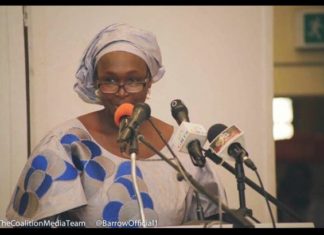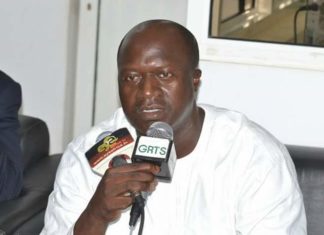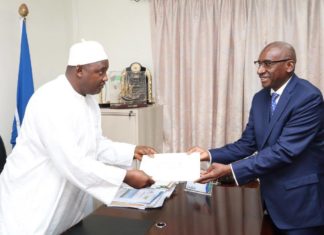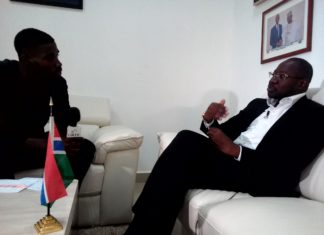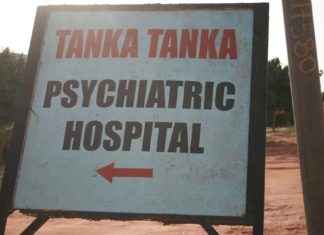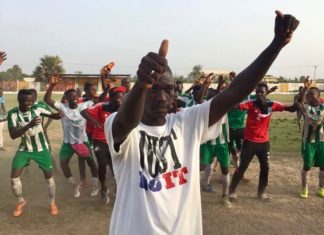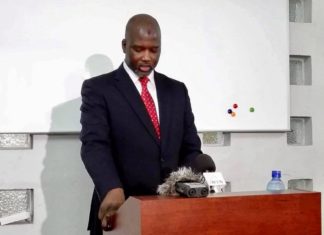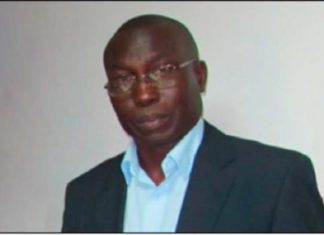VEHICLES GIVEN TO NAMS DONATED BY A ‘BARROW SUPPORTER’
The vehicles recently given to parliamentarians were provided by “a supporter” of President Adama Barrow who wants to be anonymous, Amie Bojang, spokesperson of the presidency told...
This Commission Is Not A Ping Pong Game Chairman Janneh Tells Bazzi
By Fatou Sowe
Sourahata Janneh, the chairman of the ongoing commission of inquiry probing into the financial activities of former President Jammeh, on Wednesday told Muhammad Bazzi...
‘No Foul Play In Dutch National’s Death’ Police PRO
By Omar WallY
The spokesperson for The Gambia Police Force, Assistant Superintendent Foday Conta, has confirmed to The Fatu Network, that there was no foul play in the...
7 senior army officers discharged
Seven senior officers, mainly majors and captains, of the Gambia Army Forces have been discharged with immediate effect, The Point has gathered.
The discharge letters were issued by...
Former Army General Preaches Peace Ahead Of Super Nawettan
By Alieu Ceesay
Former Army General and current chairman of the Super Nawettan Organizing Committee, Lang Tombong Tamba has preached for a peaceful conduct during the 2017...
President Barrow calls for Senegal and The Gambia to be a model regional integration
Fajara, 10 October 2017
President Adama Barrow this morning received a special envoy from his Senegalese counterpart, President Macky Sall.
Senegalese Foreign Minister Sidiki Kaba delivered a special message to President Barrow, reiterating President Sall’s commitment to the spirit of friendliness and good neighborliness between The Gambia and Senegal. The message also included a formal introduction of Foreign Minister Kaba to the Gambian leader. Mr Kaba was appointed Foreign Minister last month, prior to which he was Senegal’s Justice Minister.
Mr Kaba and President Barrow discussed a series of bilateral issues to further cement the friendly ties between the two countries. President Barrow expressed gratitude to the Senegalese leader and his people for their contribution in making the change and freedom possible in the New Gambia. He commended the positive role President Sall continues to play in building confidence and strengthening their cordial relationship.
President Barrow said he and his Senegalese counterpart would continue to consult one another and engage in dialogue over issues. He called on both countries to work towards being a model of regional integration by facilitating free trade across their borders.
In March this year, The Gambia and Senegal signed several cooperation
agreements to promote trade, fisheries, peace and security for the mutual benefit of the two Gambian and Senegalese people.
Presenting a piece of African art to President Barrow, Minister Kaba said the choice of artwork was a representation of the freedom Mr Barrow brought to the people of The Gambia, and the pride that Africa derived from such achievement.
Gambian Foreign Minister Ousainou Darbo, the Senegalese Ambassador to The Gambia, His Excellency, Salieu Ndiaye and other senior officials from The Gambia and Senegal attended the meeting.
Mr Sidiki Kaba is a human rights activist. He has held several ministerial portfolios before his recent appointment as Foreign Affairs Minister. With his legal background, he is known to have committed his career to promote women and political rights, as well as freedom of the Press in Senegal and beyond.
INTERVIEW OF THE HONOURABLE MINISTER BY GRTS
GRTS: We learnt you were in Switzerland for official mission. Can you tell us what this trip was about?
Minister Fatty: This was a very important event. I was the 68th Statutory Executive Committee meeting of the United nations High Commissioner for Refugees. There were 153 countries that were represented. The meeting is held annually by the United Nations High Commission for Refugees. Nations gather in order to review the work of the Standing Committee in the previous year. In this case, the Standing Committee’s performance over the last one year, The Gambia has a central role to play in that. So the main purpose of the meeting was to set the agenda for the next year; to review the state of refugees around the world; migration; for states to present reports that they have to be evaluated covering the past year; and also to make an approval of the budget of the Standing Committee for the next year. The Gambia participated because we have an experience to share with the world in terms of refugee and migration management. As you know The Gambia is a host country for refugee. We had almost 10,000 refugees living in The Gambia. The figures have gone down to precisely 7000 over the past couple of months and since this new government came into existence. We are contributing significantly towards the protection and management of refugees around the world
with this kind of refugee population on our ground. We have refugees who are fully integrated into Gambian society. These refugees live among communities and we know the figures because we have a very
comprehensive registration system. They are registered periodically. We have them profiled and we know where they live. We are working with UNHCR office in The Gambia and also the regional office in Dakar. We grant them documentation so that they can move freely in our country. The children are going to school. And so we have all the services. Refugees in The Gambia live like Gambian citizens.
GRTS: As we speak, our brother and sisters are currently in Libya and Italy mainly sweating for greener pastures while others who have failed to make it have voluntarily returned. What plans do you have to integrate them to society?
Minister Fatty: The government is not resting on its laurels. The government is working with international partners – the European Union particularly – to make sure migration can be managed properly. And we want it to serve the development interest of The Gambia. The President and the government believe that the long term approach to migration should encourage private sector growth in The Gambia. Businesses and enterprises have to be established that will help spur economic growth
enabling young people to have jobs.
GRTS: Can you tell us the current state of drug misuse or use in the country?
We have an institution under the Ministry of the Interior called the National Drug Law Enforcement Agency. It is a very strong and effective agency doing a tremendous job in terms of drug interdiction, interception, prosecution and preventing the abuse of drugs in the country. The drugs that are in the country come from other parts of the world but it’s being exaggerated. The amount of drug abuse seems to be a little bit on the rise since the coming into effect of the new government. And because of the
sense of freedom that Gambians feel, the young people in particular. But then the law is clear. Peddling in drugs and abuse of drugs continue to be illegal and the agents of the Drug Law Enforcement Agency together with the police and other law enforcement outfits will continue to clamp down on the trafficking and abuse of drugs
GRTS: Is drugs a health or criminal problem?
Minister Fatty: The problem can be viewed differently. The Gambia depends on its young people. The future of this country is in the hands of the young. If these young people are introduced into drugs, the future of the country will be mortgaged by drug dealers and peddlers. The Ministry of the Interior is intensifying its activities through the Drug Law Enforcement Agency and The Gambia government is committed and ready to put in more resources, in order to stem the flow of drugs into our country and also its abuse.
GRTS: The past government’s approach to drugs was criminal. With a new and democratic government place, are we expecting a new approach?
Minister Fatty: The way the new government sees crime is different. This is why prison reform is also coming. It’s going to be a different way of doing business. We believe that people can be rehabilitated.
We believe that when people get misguided, it falls upon society to bring them back on track. We have to have a humanistic and human rights approach. Much as the laws must be enforced, the approach of
this government centers on the human person; to make the human person a better citizen.
GRTS: What are the types of drugs that are threatening to destroy the cream of our society – the young people?
Minister Fatty: Most of the drugs that are usually abused in The Gambia are soft drugs. Cannabis, predominantly, is the drug that we are battling with. But we do have an incursion on hard drugs as well. Our law enforcement agents are very vigilant. We have very good seizures at the moment and prosecutions are also ongoing. The young people must understand that drugs is not the way. And I’m sending a warning to drug dealers that we will be on their tail.
GRTS: Finally, can you comment on the issue of passports and ID cards?
Minister Fatty: The issue of ID cards is not the creation of this
government. We did not create the problem of ID cards, we found it here. When this government came in, there were complexities of contracts and some are not in the best interest of the country. So we came in and we had to resolve just like many other issues. We have to give this country a national identification system that is consistent with international standards. We took time to look at it critically so that we can eliminate some of the distortions and fraud involved in it. The Ministry has concluded that it is time now to give Gambians a national identification system that they deserve. Cabinet has approved and a process is now in place. This process of consultation by the Ministries of the Interior and Finance and others will be completed very soon. Government will be engaging key stakeholders who are involved and a national identification system should be in place. And we hope this will happen between
November and December – if all goes well. I want to tell you that passports are being issued. We have not stopped the issuance of passports. We have terminated the issuance of MachineReadable Passports but the biometric passport production is ongoing and any Gambian who wants a
passport can get it.
Ethiene Silva conducted this interview on October 10, 2017
Turkish business interest to spur investment in The Gambia
Fajara, 11 October 2017
President Barrow today received a 14-member delegation of the Turkey–Gambia Business councils, led by Turkish Ambassador to The Gambia Ismail Sefa Yuceer.
The delegation presented specific proposals for alternative energy in The Gambia; the construction of a new children’s hospital and a general hospital; the establishment of a direct flight between Istanbul and Banjul; and the provision of Turkish scholarships to Gambian students. Ambassador Yuceer also expressed Turkish interest in broader construction and interior decoration.
Offering details on some of the proposed projects, the Chairman of the Turkey–Gambia Business Councils, Mr Aygun Karakas, said members of the two councils were ready to invest in a 40-50 megawatts solar project in The Gambia, contribute to healthcare services with a construction of a 150-bed pediatric and general hospital as well as commence bi-weekly direct flights between Istanbul and Banjul in the first quarter of 2018. President Barrow was informed that a team was already in The Gambia to carry out a feasibility study on the conditions for having regular direct flights.
In his welcoming remarks, President Barrow said Turkish investment in Africa was second only to the United States of America, but that The Gambia had not benefited much from it. He said: “Our spirit is very high. Development cannot happen without opening to the private sector.” The President also extended a welcome to Turkish companies interested in various fields, including fisheries. He assured them of his administration’s commitment to provide a democratic atmosphere, respect for rule of law, and a secure environment for business to thrive. He further assured them of the political will, which he said manifested through the setting up of an investment committee to review all serious business proposals. He encouraged them to work with the Gambia Chamber of Commerce and other stakeholders.
Apart from Turkish economic interests in The Gambia, the visiting delegation elaborated on specific social cooperate programmes to expand the scholarship package with the University of Commerce in Turkey, training of medical doctors, exchange visits with the University of The Gambia, and the provision of vocational training.
Both countries also envisage the further strengthening of bilateral cooperation through an upcoming capacity building programme for the security sector.
The Chairperson of the Turkish-Gambian Business Council (Gambian side), Mrs. Fatou Senghore attended the meeting. Also present were the President of GCCI, Mr. Muhammed Jagana, who is also Ambassador at large, the Coordinator of the Gambia Turkish Business Council Mrs. Aji Sally Sagnia Cham, and other officials.
The President Barrow Youth Movement Ordered To Change Its Name By The Presidency
By Alieu Ceesay
The Office Of The President has given directives for a name change to the newly formed “Adama Barrow’s Youth Movement”, The Fatu Network has gathered....
Corendon Lands In Banjul with 134 Tourists As Season Begins in Earnest
By Yunus S Saliu
In a conducive and relaxation atmosphere, the Gambia Tourism Board under the aegis of Ministry of Tourism and Culture received the first flight marking...
The Meaning of Fabakary Tombong Jatta
The Facts
From 1994 to 2017 The Gambia has been certified as a dictatorship by all accounts, locally and internationally. The country witnessed arbitrary arrests, detentions and torture...
‘No Electricity At Tanka Tanka To Attend To patients At Night’ MP Baba Galleh...
Gambia’s major referral psychiatric hospital, Tanka Tanka, is said to be abandoned without electricity to attend to the patients admitted at the hospital at night.
Honorable Baba Galleh...
First VP Of The Gambia Coaches’ Association Resigns
By Alieu Ceesay
The head coach of GFF domestic 1st division side GAF, Ebou Jarra has confirmed his resignation as the 1st Vice President of The Gambia...
‘Jammeh Had a Big Appetite for Money’ Njogu Bah
By Fatou Sowe
Dr Njogu L Bah the former secretary general and head of the civil service has said that former President Jammeh had a big appetite for...
Let’s Stop Lambasting Our Women As Per Their Active Participation in Politics!
I feel very staggered, flabbergasted, bowled over, perturbed and provoked beyond all human endurance, when men use the key board to lambaste and attack our own women as far beyond the red sea.
At home they are to do all sorts of household work like cooking, washing, cleaning, harvesting , etc. In the early days women were seen as wives who were intended to cook, clean, and take care of the kids. They were not allowed to vote while men took care of having jobs and paying any bills that had to be paid. Soon enough it caught on that women should have a bigger role than what other people thought they should have.
Gender equality is, first and foremost, a human right. A woman is entitled to live in dignity and in freedom from want and from fear. Empowering women is also a vital tool for advancing development and reducing poverty. Empowered women contribute to the health and productivity of whole families and communities and to improve prospects for the next generation.
Today women are playing important role in all spheres of life. They are no longer confined within the four walls of their parents’ or husbands’ house.
They have come out of the kitchens and are working hand in hand with men in all the development programs of the government. By receiving higher education they are becoming pilots, doctors, engineers, hospitality professionals, teachers, administrators , etc. They have been able to prove their worth.
They not only do their household work but also work outside of their houses. They are contributing much to the economy of the country.
I discovered my life was 87% positively impacted by women! My full-time parent I learnt most from (Mom), my teachers right from kindergarten to university (8/10 have been female), all my advocacy
Campaigns were 64% women dominated!
Therefore, we need to amplify women’s voices out there, no matter how small their contribution is to society. The teachers, mothers, cooks, civil servants, employees, employers, leaders and more! Regardless of whom they are married to, background, looks and more! Women are the most vital part of our society and are to be celebrated. Every day, I choose to celebrate the women in my life, past and time to come.
When they’re in parliament, for example, they promote women’s rights legislation. When women are in sufficient numbers in parliaments they also promote children’s rights and they tend to speak up more for the interests of communities, local communities, because of their close involvement in community life,
The evidence shows that female leaders typically have more compassion and empathy, and a more open and inclusive negotiation style. This is not, of course, necessarily true of all women -- there are many different leadership styles. That said, modern ideas of transformative leadership are more in line with qualities women generally share: empathy, inclusiveness and an open negotiation style.
Today's global problems require leaders that have diverse skill sets and innovation that can only come from diverse ideas and players. Women bring the skills, different perspectives and structural and cultural difference to drive effective solutions. In short, female leaders change the way global solutions are forged.
But having more female leaders from politics to the boardroom is important for another reason, too. Simply having female leaders change the norms about who can lead and what qualities are necessary in leadership. Having women in leadership roles is breaking down cultural and structural barriers improving leadership around the world and showing everyone what women can achieve.
Women face several obstacles to participating in political life. Structural barriers through discriminatory laws and institutions still limit women’s options to run for office. Capacity gaps mean women are less likely than men to have the education, contacts and resources needed to become an
Effective leaders.
Now it has come to the realization that true development of the country is not possible keeping half of population idle at home. So it needs no telling that women are playing a great role in the socioeconomic condition of our country.
Therefore we have to give the women the room to showcase their talent beyond any imagination. It is the only way we can make The Gambia great once more again.
By: Saidina Alieu Jarjou
Blogger/Activist/Watchdog.
Fabakary Tombong Jatta Must Face Prosecution
By the revelations of the Janneh Commission it is vividly clear that APRC NAMs led by Fabakary Tombong Jatta have woefully failed in their legal duties to...
Business Tycoon Muhammed Bazzi Withdraws Application to Testify Behind Closed Doors
By Fatou Sowe
Lebanese business tycoon Muhammad Bazzi has finally decided to testify about his financial and business activities with the former president openly before the commission...
Justice Minister Meets The Press
The Attorney General and Minister of Justice, Abubacarr Tambadou has updated the press about activities at his ministry.
The Justice Minister has highlighted several important issues including the...
With Jammeh’s Executive Directives Professionalism Was Out Of SSHFC Says Edward Graham
By Fatou Sowe
The former managing director of the Social Security and Housing Finance Corporation, Edward Graham has reappeared at the Janneh Commission to further explain the various...
Gambia To Play Former President’s Host Country
The Gambia Football Federation (GFF) what's announced that it has finalised arrangements for a friendly international football match between the Scorpions of The Gambia and the senior...

